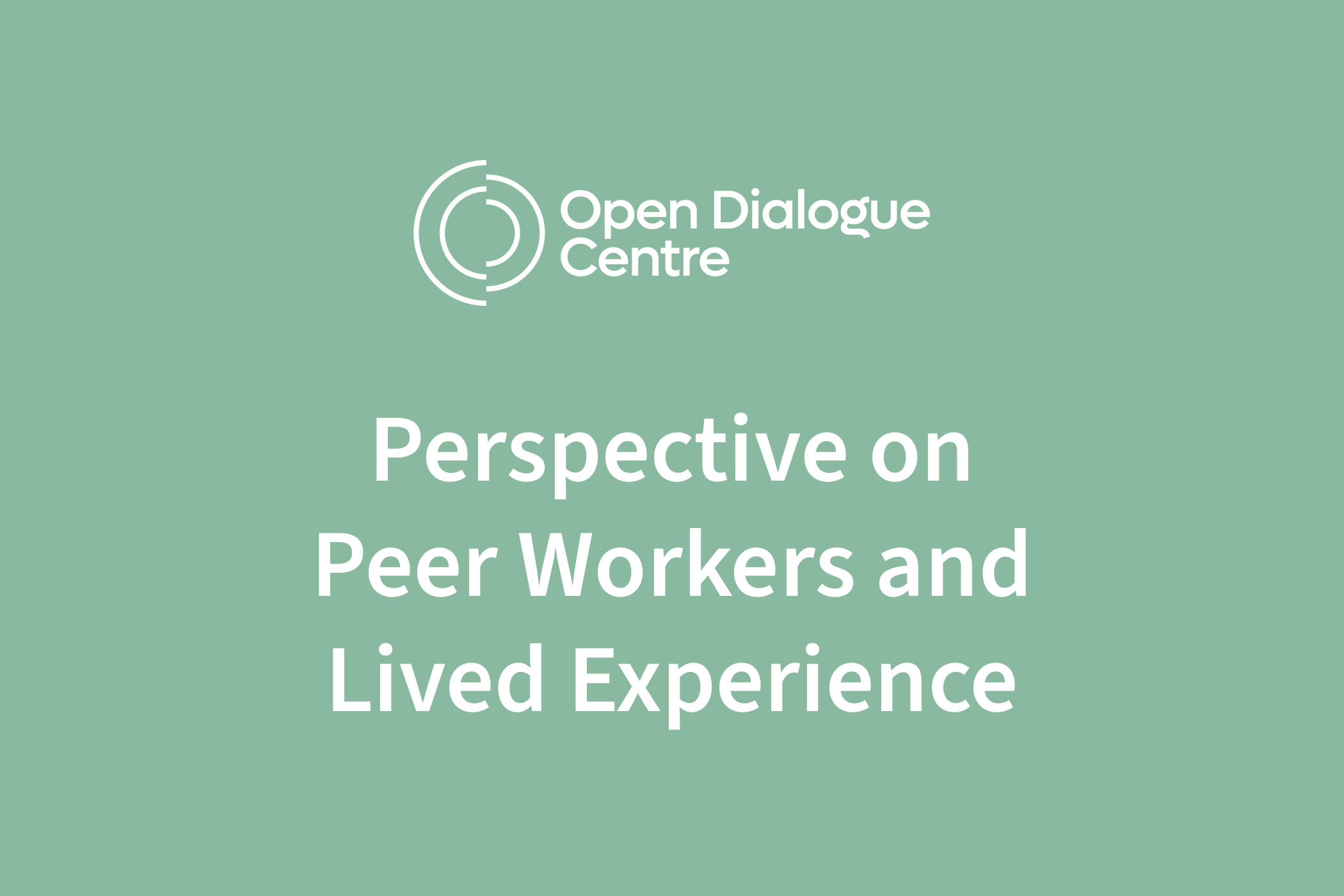Perspective on Peer Workers and Lived Experience
Peer Workers and Lived Experience in Open Dialogue: Experiences, Dilemmas and Dialogues
By Flick Grey

As Open Dialogue is adopted and adapted internationally, beyond its initial home in northern Europe, it encounters other cultures and other ways of being together. One of these cultural adaptations has been the involvement of people who identify as service users/survivors/carers/peer workers/people with lived experience in Open Dialogue teams.
Funded by a SANE Hocking Fellowship, I travelled to nine countries and interviewed 81 people working at the intersection between peers/lived experience and Open Dialogue. I subsequently wrote up my research as my final thesis for my three-year Open Dialogue UK training.
Because research participants were recruited through personal introductions, there was a high degree of trust, candour and hospitality, including home-cooked meals, open homes, even an ice cream run from an inpatient unit in Central Europe.
Rather than summarise (a 20-page thesis, which I am happy to share), I have chosen to juxtapose direct quotes, to offer a glimpse into what people have been grappling with:
‘I would not go out there [to conduct a network meeting] without a peer [worker], why would I?’ (Open Dialogue clinician, Germany)
‘Why is “including” people with lived experience any different from any other voices. Are they different? Why not with everybody?’ (Participant in a workshop on peer workers in Open Dialogue, Lithuania)
‘Open Dialogue is an approach that seeks to privilege all voices within a social network, which may conflict with peer work, which specifically aims to support and advocate for a person who is experiencing a crisis, and not necessarily for other members of the social network.’ (Bellingham et al 2018:7)
‘These questions were made all the more difficult because of the tension between trying to treat peers … “like anyone else on the team” and trying to hono[u]r their particular form of expertise.’ (Parachute NYC 2015:50)
[Many clinicians noted] ‘how much they’ve learned from peers that their clinical training did not teach them. In particular, they have found ways to share personal experiences with clients and to open themselves up in ways that were not possible (or maybe not allowed) before.’ (Parachute NYC 2015:46)
‘Everyone also thought it was very strange having me in this [service]. There was a lot of insecurity amongst the other colleagues. What was I going to say? Was it dangerous to have me in the staff room? And so on. Could they speak freely and openly when I was sitting at the table?’ (Peer worker, Europe)
‘The clinicians that I worked with the most, there was a lot of really good conversations, a lot of … discomfort. … Over time they learned a little bit more about what a peer is. … It was through personal contact.’ (Peer worker, USA)
‘When I started on the […] team, the situation for peers was really bad. We were kind of just being brought along to the meeting. We really didn’t have a voice, we weren’t really seen as that important in the network meetings. … the attitudes towards peers were really shocking.’ (Peer worker, USA)
‘The challenge, of course, is to fashion some sort of respectful working understanding that can accommodate the awkward fact that the same system that hosts Parachute NYC [the public mental health system in New York City], has invited IPS [Intentional Peer Support] to train its cadres, and is opening itself to substantial peer involvement also has a history of having hurt and humiliated many in the room.’ (Parachute NYC 2015:38)
‘There was a clinician I worked with who was like ‘I don’t’ want to work with a patient!’ You know, like ‘What if they have a crisis, what am I going to do?’’ (Peer worker, USA)
‘As part of the Trust [service], they [peer workers] are pretty alone. There wasn’t a network, there wasn’t support, there wasn’t policies. There wasn’t anything, really, in terms of how they work.’ (Open Dialogue clinician, UK)
‘How do we value all voices, ensure all voices are equally heard, when we’re still in a hierarchical structure? … You don’t consider it when you’re the one in power, you think you’re being very equal. … We should be able to have those kinds of honest conversations.’ (Open Dialogue clinician, UK)
As one of the trainers on the One-Year Open Dialogue Foundation Course next year, I’m very much look forward to ongoing dialogue with our community going forward, as we find our own ways through these opportunities, dilemmas and complexities.
References:
Bellingham, B., Buus, N., McCloughen, A., Dawson, L., Schweizer, R. Mikes-Liu, K., Peetz, A., Boydell, K. & River, J. (2018). Peer work in Open Dialogue: A discussion paper. International Journal of Mental Health Nursing, 1-10. doi: 10.1111/inm.12457
Parachute NYC (2015). Parachute NYC: Tracing the Origins, Development, and Implementation of an Innovative Alternative to Psychiatric Crisis. WHITE PAPER. [Unpublished]

